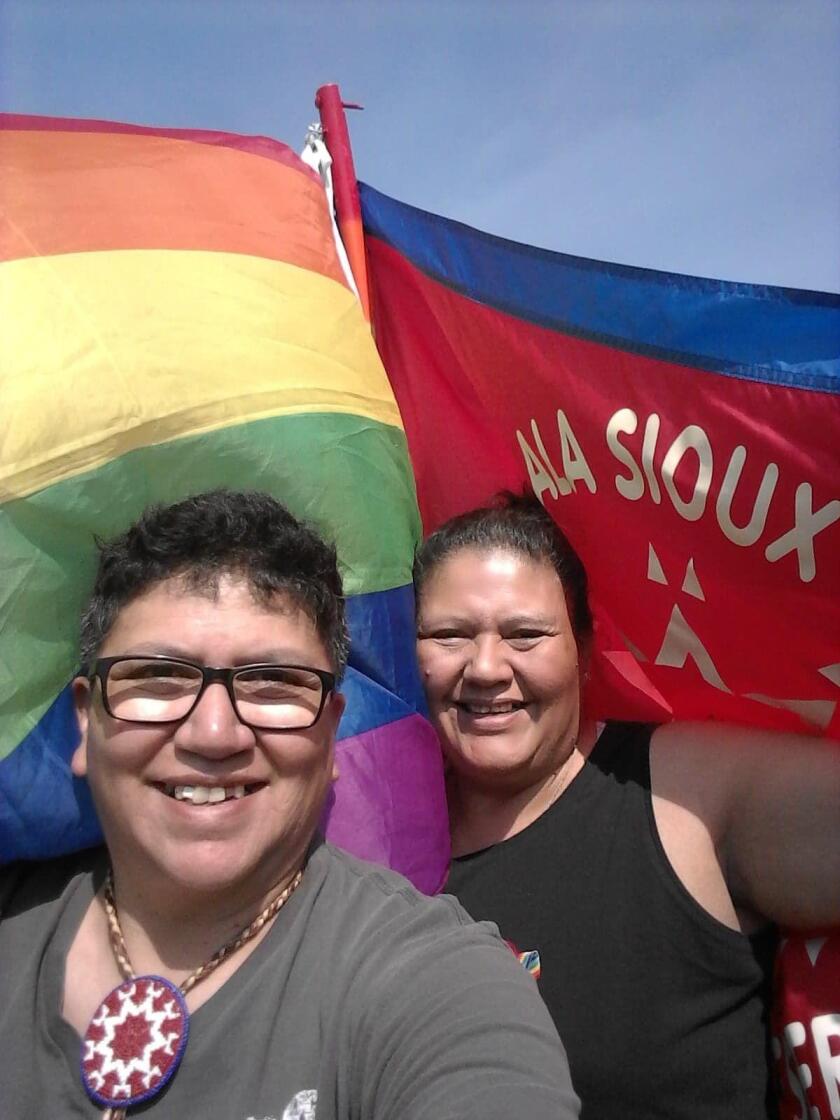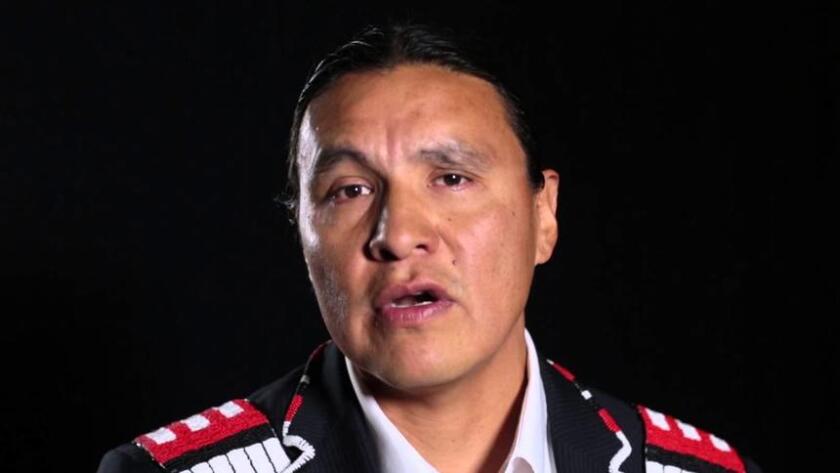RAPID CITY, S.D. — Monique "Muffie" Mousseau and Felipa De Leon are going tribe to tribe in South Dakota to advocate for protections and marriage equality for those who are “two spirit” — the modern umbrella term often used in Indigenous communities to define those who identify as LGBTQ.
The two women have been married for 15 years — legally for four after the U.S. Supreme Court legalized gay marriage in 2015. But their own tribe on the Pine Ridge Reservation in South Dakota didn’t recognize their marriage or even protect their sexual orientation from hate crimes until this year.
ADVERTISEMENT
The couple spent months lobbying for the Oglala Sioux Tribe to allow gay marriage and protect gender identity and sexual orientation in their hate crime laws. This summer, the tribe approved both measures.
“It was a feeling of accomplishment and excitement and gratitude, knowing other two spirit couples can go back to our reservation and receive their marriage license,” De Leon said. Next year, the couple said they’ll renew their vows on their reservation.
But the couple said their work isn’t finished yet. They’re going to all nine tribes in South Dakota to lobby for rule changes. After that, they will lobby the state to update its hate crime law, and after that, they will move on to tribes in other states.
“I don’t feel like I’ve accomplished anything yet,” Mousseau said. “The fight is still the fight.”

The term two spirit came about in the 1990s, according to Candi Brings Plenty, Indigenous Justice Organizer for the American Civil Liberties Union of South Dakota, North Dakota and Wyoming. The term, she said, recognizes the masculinity and femininity in one person.
ADVERTISEMENT
Two spirit people “bridge that gap between the masculine and feminine,” she said.
Brings Plenty, a member of the Oglala Sioux Tribe and two spirit identified, started in a newly created position with the ACLU in October. Her role includes protecting pipeline protests and free speech, strengthening voting accessibility for tribal communities, focusing on the epidemic of missing and murdered Indigenous women and girls, and promoting two spirit inclusion, according to a press release from the ACLU.
When it comes to two spirit inclusion, “tribes are definitely behind,” she said. “It’s not that they’re resistant. It’s a matter of them not having the advocacy to pursue and change those laws.”
Tribes must “honor our two spirit youth and empower them,” she said, and that starts at the grassroots level.
Mousseau grew up on the Pine Ridge Reservation and became a cop for the tribe in 2002. But she said once others realized she was going out with women, she “started getting gay bashed,” and that took its toll on her. So in 2009, she and her wife left South Dakota, moving to New Mexico, where they felt safer because there was more diversity.
In 2011, they moved to North Dakota for work and to be closer to family. While in North Dakota, De Leon’s niece died by suicide. At the funeral, De Leon learned she was two spirit identified.
“It was really hard to lose her," she said. "But it was even harder to know that she wasn’t getting the support she needed, especially trying to figure out her identity,”
ADVERTISEMENT
In 2016, the couple returned to South Dakota, and last spring, Mousseau quit her job as an overnight stocker at Walmart to start advocating for two spirit equality on Pine Ridge.
Two spirit people had been reaching out to the couple, telling their horror stories about hardships the Indigenous LGBTQ community faced, .
“In May, I began this journey with my tribe because people are continually contacting us saying, 'You need to do something,'” Mousseau said. “I’m not on this journey for recognition. I’m on this journey because there was too much pain given to me from many, many Native American people who are LGBTQ.”
When the tribe legalized gay marriage in July, Chase Iron Eyes, lead counsel for the Lakota People’s Law Project and public relations director for Oglala Sioux Tribe President Julian Bear Runner, said he witnessed history being made.
“We were evolving, and we were healing at the same time,” he said.

ADVERTISEMENT
Mousseau said she never expected the tribe would pass two new laws with respect to the LGBTQ community. She wants to continue advocating for other tribes in the state, find funding to continue the work and perhaps start a nonprofit.
Once all nine tribes in the state update their hate crime laws to protect individuals on the basis of gender identity and sexual orientation, she said she’s going to go to the South Dakota state government and say, “You have nine tribes in your state that passed it. Why are you still shrugging that bill out?”
Fifteen states, including South Dakota and North Dakota, don’t include sexual orientation or gender identity in their hate crime laws, according to the , an independent, nonprofit think tank. Nineteen states and the District of Columbia protect both statuses, while three other states don’t have hate crime laws at all.
Mousseau said the couple will head to the Standing Rock Sioux Reservation next. After that, they’ll head to the Cheyenne River Sioux Reservation, then to Rosebud.
When they started on their journey, none of the tribes had hate crime laws for two spirit people. But in the months since, Crow Creek and Pine Ridge have included LGBTQ protections in their laws.
“I look at this fight as an adventurous journey to bring protections for the next generations,” Mousseau said. “I consider everybody equal. The shaming and bashing is the wrong thing.”
ADVERTISEMENT









